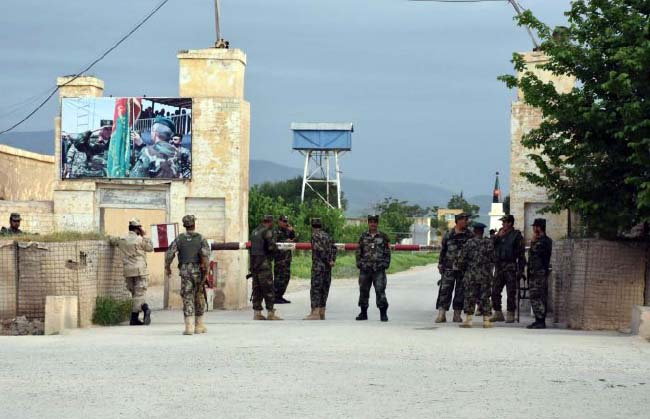Following the Friday’s deadly attacks on a military base in Mazar-e-Sharif, Afghan MPs lashed out at Pakistan. The attack, which killed and wounded hundreds of Afghan soldiers, outraged the nation and officials and triggered public sensation. Terrorism has been one of the serious issues for more than a decade and a bone of contention between Kabul and Islamabad. The Afghan-Pak officials exchanged harsh rhetoric regarding the Taliban’s heavy offensives in recent years. Militancy led to strong mistrust not only between Afghanistan and Pakistan but also between state and nation.
After the February 14 attack on Lal Shahbaz Qalandar in Sehwan, which was claimed by the self-styled Islamic State of Iraq and the Levant (ISIL), Pakistani officials alleged that the militants had organized the assault from Afghanistan’s soil and showed military backlash against the country through firing missile at Nangarhar province. The attack prompted public hatred against Pakistan although it was not responded by Kabul government that has denied the Islamabad’s claim. Condemning the attack on Lal Shahbaz Qalandar, Ghani said that Afghan government had proved its honesty and commitment in fight against terrorism and added, “Honesty and the will to fight against terrorism will prevent terrorists from carrying out their subversive activities in any country.”
The blame game continues with the recent attack on unarmed Afghan soldiers in Mazar-e-Sharif. This time, Afghan MPs called on Islamabad in a serious tone to stop supporting terrorism. However, Pakistan Prime Minister Nawaz Sharif and Chief of Army Staff Gen. Qamar Javed Bajwa condemned the attack and called terrorist a common enemy. “Our heart goes out to the victims of this terrorist attack. We express our heartfelt condolences with the bereaved families and pray for speedy recovery of the injured. Terrorism is a common enemy and a threat to peace in the region,” Sharif is cited as saying.
No wonder, Afghan-Pak governments are beset by escalated militancy and sustained indescribable fatalities in this regard. Streams of blood were shed in these two Islamic lands without abating militancy. Perhaps Afghanistan bears the brunt of terrorism in Asia as France does in Europe. The blame game goes on in vain. It is self-explanatory that Afghanistan and Pakistan are blackmailed by a number of warring parties, the Taliban and the ISIL group pose the strongest threat. So, why should put the blame on each other?
It is believed that the blame game will be an obstacle on the way to cooperation. Regardless of any facts, we are member of the UN’s families and “should act towards one another in a spirit of brotherhood”. Before bringing the Taliban to negotiating table, which has been a hot issue within a decade or so, the Kabul and Islamabad governments will have to nurture a friendly relation and resolve their own problem. To put it another way, stop the blame game.
Second, the unabated insurgency which is leading to high fatalities will widen the gap between state and nation. According to public belief, there are many challenges within the government apparatus. For instance, the MPs called on Afghan President Muhammad Ashraf Ghani to announce the remaining members of his cabinet. They further expressed concerns over violation of the Constitution. Although Afghan defense minister Abdullah Habibi resigned following the attack, the MPs said that the problems are too challenging to be resolved with his resignation. Similarly, Shah Gul Rezayi commented that the Afghan High Peace Council (HPC) was a burden on the nation without a tangible result. Hence, the said issues reflect the fact that there are challenges in the government machinery as well. These issues will undoubtedly make people lose their trust in the government.
Lack of respect to Constitution is crystal clear. The establishment of National Unity Government (NUG) is the product of Ghani and Abdullah’s political agreement and is not supported constitutionally. In addition, the legal period of parliament was terminated long ago without announcing the date for parliamentary election. Worst of all, some ministries are still being managed by acting heads. These are the problems to be addressed instantly in such a critical state so as to bridge the gap between state and nation.
Militant fighters are always answering the call for peace at gunpoint. I strongly believe that the Taliban will never come to negotiating table especially with the ideologue figure Haibatullah at the helm. The futility of HPC in this respect is beyond doubt and should be cancelled as its founder Hamid Karzai, Afghanistan’s former President, who showed great tolerance towards the Taliban said that he would no longer call the Taliban “discontented brother”. So, the point is that the Taliban are not a political party to hold talks but a terrorist group with radical ideology seeking to continue violence and bloodshed.
To sum up, Kabul and Islamabad must put an end to the blame game since its continuation will compound the mistrust and leave no room for friendly rehearsal. Meanwhile, the government has to fill the nation-state gap through putting law into practice.

